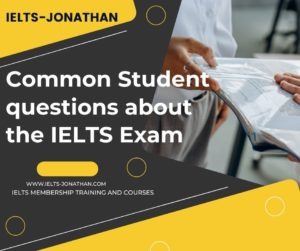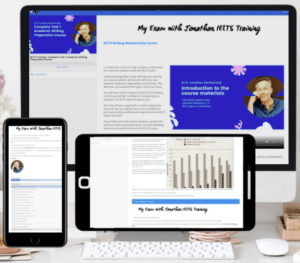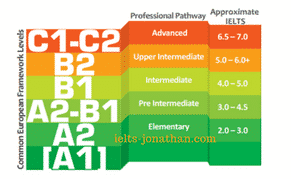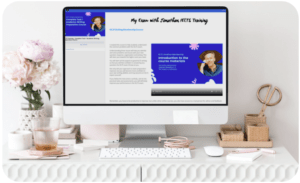31 Questions students have about the IELTS Exam
The aim of this guide is to help you:
⦁ Become organised and ready for your exam
⦁ Learn the essential grammar and vocabulary
⦁ Practice the 4 skills and learn the strategies for IELTS, a multi ‘task’ exam
⦁ Keep you motivated, confident and stress free
I’m Jonathan, an IELTS Specialist.
I’m here to help you achieve the score you need in YOUR IELTS exam.
Where do I start?
Is a question I often get asked
“My exam is coming, what can I do? Where do I start?”
There is so much social media information, it’s difficult to know who and what to trust so you have covered everything for your exam.
I’ve been teaching IELTS for a long time, I believe I can find the answer to any question you might have!
First things first: the hard reality.
“IELTS has never been an easy exam – it is designed to test your English level and ability up to Band Level 9, so it has to be graded and progressively difficult in places.”
The good news…..
“IELTS is simply a test of your English, so anything you learn from this website will help improve your score.
When I do a live Zoom or Facebook session or go through the many emails I get every day, I often get asked questions that appear very similar.
Because of their similarities, I have put together this booklet to make it simple and easy to find the answers you are looking for.
Some of the answers might be new to you, or just simply surprising!
#Life Hack
If you can’t find the specific answer you want, don’t worry just Google it!
Do this by going to Google and enter ‘ IELTS Jonathan + your question’.
You will probably find the answer there.
General IELTS Questions
Because so many of the questions I receive about IELTS are very broad, there can’t be one answer, so I thought it best to provide answers for them here.
It’s important to point out there are no secrets or tricks, these don’t exist!
I provide only reliable advice and strategies that you need to take the time to learn.
Question 1 How can I prepare for IELTS?
A number of factors determine how to successfully prepare for IELTS.
These include language level and ability, your focus and motivation, time scale, as well as experience and knowledge of the test.
Not having the motivation, taking the test too soon, repeating the same mistakes, all relate to the preparation strategies you should follow.
Go here for my Ultimate Guide to IELTS Preparation
Question 2 How can I improve my speaking?
Language levels, generating ideas and prior experience of the test can all affect your performance but there are certain things you can do to improve your confidence and speaking.
Go here for my Guide and Resources for IELTS Speaking
Question 3 How can I improve my writing?
Writing is where most students have the most difficulties, and no wonder!
It’s a large topic and really requires a decent amount of preparation.
Whether it is conclusions, overviews, giving opinions or responding to essay questions, I’ve provided the links for you here.
Go here for my Guide to Task 1 Writing
Go here for my Guide to Task 2 Writing
Go here for my Guide to Task 2 Essay Responses
Question 4 How can I improve my reading?
There are a number of methods and strategies to improving your reading, and it is often important to think holistically.
For example, when doing IELTS Reading tests, the skill you are practicing is IELTS Reading test strategies.
If your language level is very high, then this is enough. If you are a developing learner, you may need to follow other general reading strategies.
Try not to use online tests, these generally don’t reflect the skills you need to develop for the IELTS test so only use original materials.
Go here for my Guide to IELTS Reading
Question 5 How can I improve my listening?
Thinking holistically also applies to listening too.
If your language level is very high, then just doing listening tests for strategies might be suitable but a developing language learner with little exposure to a number of accents may require other listening strategies in addition to this.
Go here for my Guide to IELTS Listening
Question 6 Which IELTS skill is the most difficult?
This is a really difficult question!
IELTS has been developed over many years by professional linguists and is designed to test either your General or Academic level of English, so it is fair to say that all sections of the test are equally as challenging as each other.
What is important to note is the Band Scores demonstrate the level of the user and so sections of the test differ in level of difficulty.
So, for example, Part 3 of the speaking exam is designed to be more challenging than Part 2.
In an effort of fairness, even the questions in that section can also be graded toward the level of the candidate.
What is probably more relevant to difficulty levels is your academic background and level of language and experience.
For example, an Italian may be strong at speaking for a number of complicated reasons, whereas a Chinese speaker may be less so, but able to read and find answers in an extensive text.
Go here for my Guides to IELTS Band Score and Language Levels
Specific Questions
Question 7 What is the difference between IELTS Academic and IELTS General?
The basic differences between these tests are that one exam is geared towards work and social situations, whereas the other tests the demands of academic study.
While some people argue that the General test is easier, you must check you are taking the correct test.
For example, universities and colleges will not accept the General Test as evidence of language level, and if you are a native speaker planning to emigrate and work, then there is no reason to take the Academic test.
Go here for my Guide to IELTS Academic and General Test Guides
Question 8 Which is easier, the Computer Based IELTS Test or the Paper Based IELTS Test?
I think this question is purely subjective.
If you are familiar with technology, using a laptop or PC daily, this method may appeal to you, and likewise, if you prefer a pen, paper or a book, the paper test might be more appropriate.
Both have their advantages and downsides though.
Go here for my Guide to IELTS Computer Based Test Guides
Question 9 Should I use a British or American accent in IELTS speaking?
In 2020, the idea of an accent and the relation to your level of English is so much less relevant than before but copying an accent directly may risk you sounding strange.
A good IELTS speaker will be aware of the influence of their native language on their English and will try to iron out these influences that might be marked down, aiming for a neutral accent.
There is nothing wrong with an established accent and there are many! The point to take home is to sound clear so the examiner understands what you are saying.
Go here for my Guide to IELTS Speaking and Pronunciation
Question 10 What is the difference between IELTS and UKVI?
The main difference between these two abbreviations are that IELTS is the overall examining body, and UKVI is the visa processing body.
For example, if you are starting a foundation or pre-sessional university programme in the UK, then for the period of language study you would require an IELTS UKVI.
The IELTS test for UKVI is for administrative requirements for UK Visas and Immigration. There are no differences in the test format or questions.
Go here for this Guide to IELTS and UKVI.
Question 11 What is IELTS Indicator? Is it free?
No, currently the fee is $149.
IELTS Indicator is also just a guide as to your level.
Yes, it has been authorised, constructed and carried out by IELTS but it is only a measurement.
It cannot be used for immigration purposes and is not accepted by universities, yet.
Go here for the Guide to IELTS Indicator
Question 12 What is IDP and BC? Is one easier than the other.
IDP and BC, together with Cambridge English Language Assessment are all part owners of the IELTS company.
This means that the IELTS test you take is the same whether it is at the British Council or IDP Education.
The examiners are trained to the same exact standards and use the same marking criteria.
So no, booking your test at IDP or BC does not mean the test will be easier.
Go here for my Guide to IELTS Preparation.
Question 13 Should I write a conclusion in IELTS Task 1?
The simple answer is no, you shouldn’t. A conclusion is a summary of your main idea and often your opinion.
Task 1 is about reporting in the correct tense the most important features, and there should be no room for your opinion or speculation.
The correct word for this part of a Task 1 writing is the ‘overview’.
I feel students get confused because some teachers, textbooks and websites refer to the overview as the conclusion as this can be the final section of writing for a Task 1 essay, or final note about the information you can see.
This is misleading, as the ‘overview paragraph’ can come almost anywhere in the essay (I prefer to refer to it as a report, and not an essay!), for example, after the introduction paragraph or at the end.
Go here for my Guide to IELTS Task 1 Overviews.
Question 14 Can I use capital letters in the IELTS Listening and Reading tests?
The answer is yes, there is no marking difference, but it is important to pay attention to numbers, abbreviations and symbols, as you can lose marks here.
Go here for my Guide to IELTS Reading and Listening Test.
Question 15 Do you have a free-online course?
Yes, I regularly launch an online IELTS challenge called IELTS MasterMind for students aiming for a 7 or above.
I open the course 3 or 4 times a year. If you are interested, there is a link to follow here.
Question 16 How do I get Band 7/8 or 9 in writing?
I tell students the key to this is understanding what the examiners want to see!
Too often capable students, even those with PHDs, fail to get a high score!
Sometimes it is important to set limits, for example there is little point in wasting time answer questions in reading and listening aimed at Band 8 and 9 students when you need to get 7 overall.
You can read about what you need to do to get that higher score here.
Go here for my Guide to IELTS Band Score
Question 17 How can I improve my grammar?
The best way to improve your grammar is to discover the mistakes that you make.
If you have an English teacher, you can ask them to check your work and point out the most common or obvious mistake you are making.
You might be quite good at using a variety of tenses, but you are not so good with articles, prepositions, punctuation or word order.
Often language users may make mistakes in English related to their first language. So, you need to learn or review the rules where you have weaknesses.
Resources:
Use Google to find thousands of websites that allow you to practice for free.
If you want an indication of your level, and some recommendations you can use this online Reading and Listening test by Kaplan
When you know you have weaknesses, then you can practice effectively and efficiently.
It is not enough to say you understand, you need to be productive in the active skills of speaking and writing too.
You will then see improvements!
Go here for my Guide to IELTS Most Common Grammar and Vocabulary Mistakes.
Question 18 Does academic language help me get a high score?
There is a simple answer to this, and you can find that answer here.
Briefly, displaying more academic language shows an element of language control and sophistication, but using language that you don’t really understand is an obvious give away of learnt phrases which lower your score and may make you sound preposterous!
Go here for my Guide to IELTS High Level Language.
Question 19 Can I use idioms and phrasal verbs to get a higher score?
The answer is no, not always!
Idiomatic use is difficult and there is no reason to learn lists of idioms on their own, this makes you sound odd, and there is NO room for idioms in Task 1 or Task 2 writing.
Examples of idioms that lower the band score ☹ in writing included
“Double edge sword”
‘Two sides to a coin’
‘On the other side of the coin’
among others…….
A Simple Guide:
In Task 1 you need some phrasal verbs to describe, for example, changes
Task 2 should be formal academic language so very few phrasal verbs and probably NO room for idioms.
General Task 1 This depends on the instructions. If you have to write a letter to a friend then there is a good chance you can use some phrasal verbs and idioms, as this requires informal language, but writing a letter of complaint about a service, is a no, no …..this requires more formal language and writing conventions.
This applies to speaking as well.
In speaking, there is a good chance to use phrasal verbs and idioms, but don’t drop idioms into the conversation for the sake of it
If you know some, then if you get the genuine opportunity to use them then fine
Go here for my Guide to IELTS Idioms.
Question 20 What is the difference between a Band 5 and 8 in IELTS? How to get 7
In both speaking and writing, you can gain an understanding of the differences by looking at the Band Score criteria carefully and noticing the differences. You can find the Band Score here.
The reality of the Band scores are these indicate the level of language and accuracy, the ability to structure a piece of writing or speech and the ability to understand verbal and written instructions and respond appropriately (Task Achievement)
As you can see, IELTS is a multi-skills test and is in the C1 level.
You can practice grammar and vocabulary at the level above yours here.
Go here for my Guide to IELTS High Level Language.
Question 21 Can you correct my writing?
Yes, I can but I only do this in my Membership Group.
I can provide correction and feedback on the four IELTS criteria and general constructive feedback on your writing too.
This provides an excellent guide to your current level of English and an indication of your possible IELTS performance.
You can find access to the correction offers here.
There are two important points that should be mentioned.
The first being that my opinion is only on the writing you have given me.
In the real test, you might perform better or worse, the question may be unknown to you or very familiar, so it is therefore just an honest and fair indication of your submitted writing based on genuine IELTS questions.
The second point is that any IELTS correction service is useless if students do not react and improve on the feedback they are given.
Students that repeatedly submit the same mistakes are wasting their money and my time.
I prefer to see results, but you have to work to get results.
Go here for my Guide to IELTS Membership
Question 22 Can I use personal pronouns in IELTS Task 2?
Yes, but only to a certain extent!
Generally, personal pronouns should be avoided because the essay should contain more formal, academic language.
Academic language attempts to be more objective than subjective, focusses more on the subject matter rather than what the writer believes and uses more passive than active constructions, like this example,
‘Studies have shown that providing vaccinations reduce infection rates.’
Tip. This is the biggest challenge that students going to university face – the jump from demonstrating their language level to the ability to write in a style suitable for higher level studies.
However, if you are asked to give a personal opinion or provide examples relevant to you, then it is fine to use these pronouns, to a limited extent.
However, using them too much may make your writing appear childlike.
Go here for my Guide to IELTS Pronouns.
Question 23 Can I use British spelling, or American?
You can use either, but you should be consistent.
The key is consistency, so if you have a teacher, check with them which spellings you are learning, British or American.
If you are independent student, do a quick spelling test and establish which rules you have learnt.
For example, is it colour or color, or sympathise or sympathize.
If it’s the former, then you are using British spelling rules, so in the test all your spellings should be spelt in British English.
Go here for my Guide to IELTS Reading and Listening.
Question 24 Do writing correction courses really work?
There has been a great deal of research on the value of feedback to both students and teachers, and the general consensus is that feedback is very useful.
However, not much research has been done on the value of writing correction services for IELTS, probably because of the commercial nature of such services.
My personal opinion is that any feedback is valuable, whether it is a service or from a class teacher, but only if students take note and act on it.
Students that submit the same mistakes again and again are wasting their money and my time.
I prefer to see results, but you have to work to get results!
Go here for my Guide to IELTS Feedback
Question 25 How can I improve my writing?
The best way to improve your writing is to read and write a lot.
Read to gain ideas and vocabulary and write to fine tune your practical skills.
Next discover the mistakes that you make.
If you have an English teacher, you can ask them to check your work organisation, structure, linking and ideas and the mistakes you are making.
When you know you have weaknesses, then you can practice.
It is not enough to say you understand, you need to be productive in the active skill of writing.
You will then see improvements!
Go here for my Guide to IELTS Correction
Question 26 How can I search for answers when doing the reading test?
In order to find the answers, it’s important to have a good level of vocabulary, not to understand every detail, but to understand the general context and gist of the exam reading.
This applies to the listening test too.
It is also important to be familiar and to practice the art of skimming and scanning a reader.
If you don’t know what these are, then this article will help you.
But there is more you can do. An official reading text with questions is designed to test your language. There are no tricks to learn, but you can follow some strategies.
IELTS Hack#
In IELTS reading, the majority of the answers follow the order of the questions.
In other words, questions A, B and C, and so on, can be answered as the text is read, for example paragraph 1, 2 and 3.
BUT……..this is not always the case!
Go here for my Guide to IELTS Reading tips
Question 27 Should I give a balanced view for agree or disagree essays?
It is quite common to give a balanced view in a university essay when you are invited to agree or disagree, but for IELTS I don’t recommend it.
Providing a balanced view demands a higher level of skill and language than simply taking one side of an argument. Besides that, you don’t get any extra time or marks, so make life simple!
A balanced view may also look like a ‘discuss both sides’ essay.
If you do this, then you will lose marks on Task Achievement when answering a do you ‘agree or disagree ‘essay.
Go here for my Guide to IELTS Essay types.
Question 28 Do you have an online course?
I do!
It is called VIP Challenge and is for students aiming to get 7 and above.
The course is a complete step by step guide with plenty of activities and opportunities to practice.
You get lots of help from me and other teachers, including zoom
Lessons, writing feedback and corrections, but numbers are limited and it is only open 3 times a year.
If you are serious and would like to join, go to this link and add your name to the waiting list. I will email you when the classes open.
Go here for my Guide to IELTS VIP Challenge Course
Question 29 How can I practice my speaking at home?
It is really easy to practice speaking if you live in an English speaking country. (I’m still surprised how many people don’t take advantage of this)
Besides that, there are plenty of different ways you can find people online, you just have to look.
Don’t believe anyone who says they can sell you an IELTS Test …., and don’t give bank account or credit card details to people you don’t know!
A good way to start will be with my Facebook Group that’s starting.
There are currently over 11 thousand likes, and plenty of people happy to practice speaking about IELTS. Click the link to join
Go here for my Guide to IELTS Speaking
Question 30 How can I increase my vocabulary?
This is a really simple tip that any English learner or native speaker should follow in 4 steps.
You need a specific notebook or App on your phone, just somewhere you can write every day.
I call this a vocabulary notebook.
Step 1
Choose a book, TV programme, radio show, magazine or Podcast (these are so popular nowadays) in a subject you are interested in.
Don’t choose something you know nothing about, as you will lose interest and not stick to the Steps. We learn best, when we enjoy what we are doing.
Step 2
Read or listen to your chosen material and pick 15 words you don’t understand. Try to guess the meaning from the surrounding context, and then note them in your vocabulary book or App
Step 3
A short time later, check the meaning of the 15 words. There are many good online dictionaries.
Next note the meaning, copy an example sentence and note other important language features like a collocation, a synonym and an antonym.
Listen to the pronunciation too but remember there are differences in British and American accents and spelling, so it is a good idea to use the same dictionary when you do this.
Step 4
Review the words after a week and after a month and try to use new words in a sentence or when you are speaking.
If you do this small thing regularly and don’t give up, your vocabulary will soon increase.
Go here for my Guide to IELTS Vocabulary.
Question 31 My test is in 7 days, what can I do?
A very popular question.
I have written a post for nervous students and those that leave the revision to the last minute! Generally speaking, if you have booked the test, you are going to have to take it. ☹
If you don’t get the result you need, then come back to me for guidance. 😊
Go here for my Guide to IELTS Preparation.
Final conclusions
There we go!
I hope you found the 31 most popular IELTS questions that I get asked useful and it will help you get the score you need in IELTS.
Studying often isn’t easy, especially when you’re studying alone AND if you’re unsure you’re doing the right things.
So guys, why not register for my Online Writing Course.
It will take you through each section of a Writing Task. Because this is a NEW course, I will limit the number of learners to 10, so I can work with you closely and get your feedback.
Please send me a message to let me know you are interested in this course.
Follow me on Facebook.
Then you will be the first to find out when it’s going live.
Thank you for your interest and keep motivated!
Jonathan
Bonus 1 – Go here for my Guide to IELTS Myths
Bonus 2 – Go here for my Guide to IELTS Most Common Learner Mistakes and Errors.







Was this helpful? Leave a comment :)